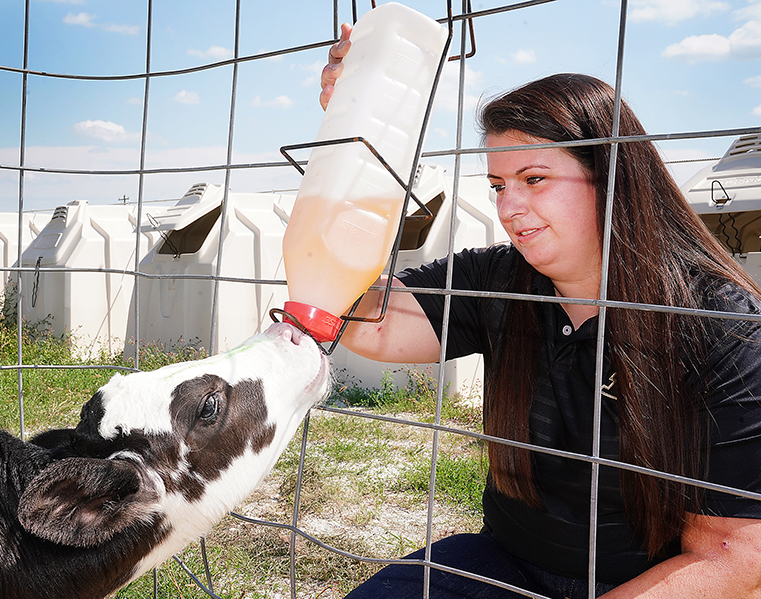The student
Like many students in agriculture, Linda Beckett grew up with a non-agriculture background and fondly refers to her upbringing in north central Maryland as “Suburbia USA.” As a sophomore animal sciences major at Virginia Tech, she answered an ad to work on a nontraditional farm in southwest Virginia, where she especially enjoyed caring for the calves and milking the cows. “I liked the character of the animal,” she explains. The experience prompted Beckett to add dairy science as a second major to earn two bachelor’s degrees, followed by a master’s in which she focused on ruminant nutrition. In an effort to diversify her education and experiences, Beckett cold emailed Shawn Donkin, former professor of animal sciences at Purdue, inquiring about openings for PhD students and noting that her research interests aligned with his. “I didn’t expect an answer — let alone an answer 20 minutes later on a Sunday afternoon — saying, “Yes, let’s explore this,’” she says. Although he is now at Oregon State University, Donkin continues to advise Beckett along with co-advisor Theresa Casey, research associate professor in Purdue’s animal sciences department. When Beckett came to visit Purdue in August 2018, she was also weighing a generous job offer from an Ohio animal feed company. “But I felt I belonged here, at another land grant university,” she says. “In talking to a wide variety of professors, I met supportive people who were generally nice and challenging in a good way, and interested in creating a rigorous program.” She began her doctoral work in January 2019.
The research
“I study the liver of dairy cattle because metabolic disease, one being fatty liver, can lead to loss of millions of dollars for the dairy industry,” Beckett says. “We’ve seen strides in nutrition and physiology, but the dairy cattle rumen puts a giant monkey wrench into how we can nutritionally change different metabolic disease states.” Beckett tracks carbon movement in the liver through different energy-producing cycles such as the tricarboxylic acid cycle. “Identifying where, how, and why carbon is lost will ultimately benefit the metabolic health of the cow,” she says. These insights could help feed specialists devise diets that promote optimal energy efficiency to reduce the potential for fatty liver, which in turn could also save dairy producers money.
Opportunities
Beckett is motivated in her research by innovative application of established tools: “The use of stable isotopes is common, but isn’t as prevalent in the animal sciences industry. So while it’s not on the cutting-edge of research, when applied to dairy cattle, it is.” With Donkin’s encouragement to apply, Beckett was named a Foundation in Food and Agriculture Fellow for 2019-2022, one of a 17-member professional development cohort across the U.S. and Canada.
Future plans
Toward her goal of securing a faculty position, Beckett will look for a postdoc working with stable isotopes as tools to characterize animal physiological pathways after completing her PhD, likely in May 2022. Outside of the field and lab, she enjoys travel and her three pet rescues — a beagle mix, Nelly, and two cats, Wilson and Wobbles. Beckett has a soft spot for senior animals and is a proponent of older-age adoptions from shelters.
